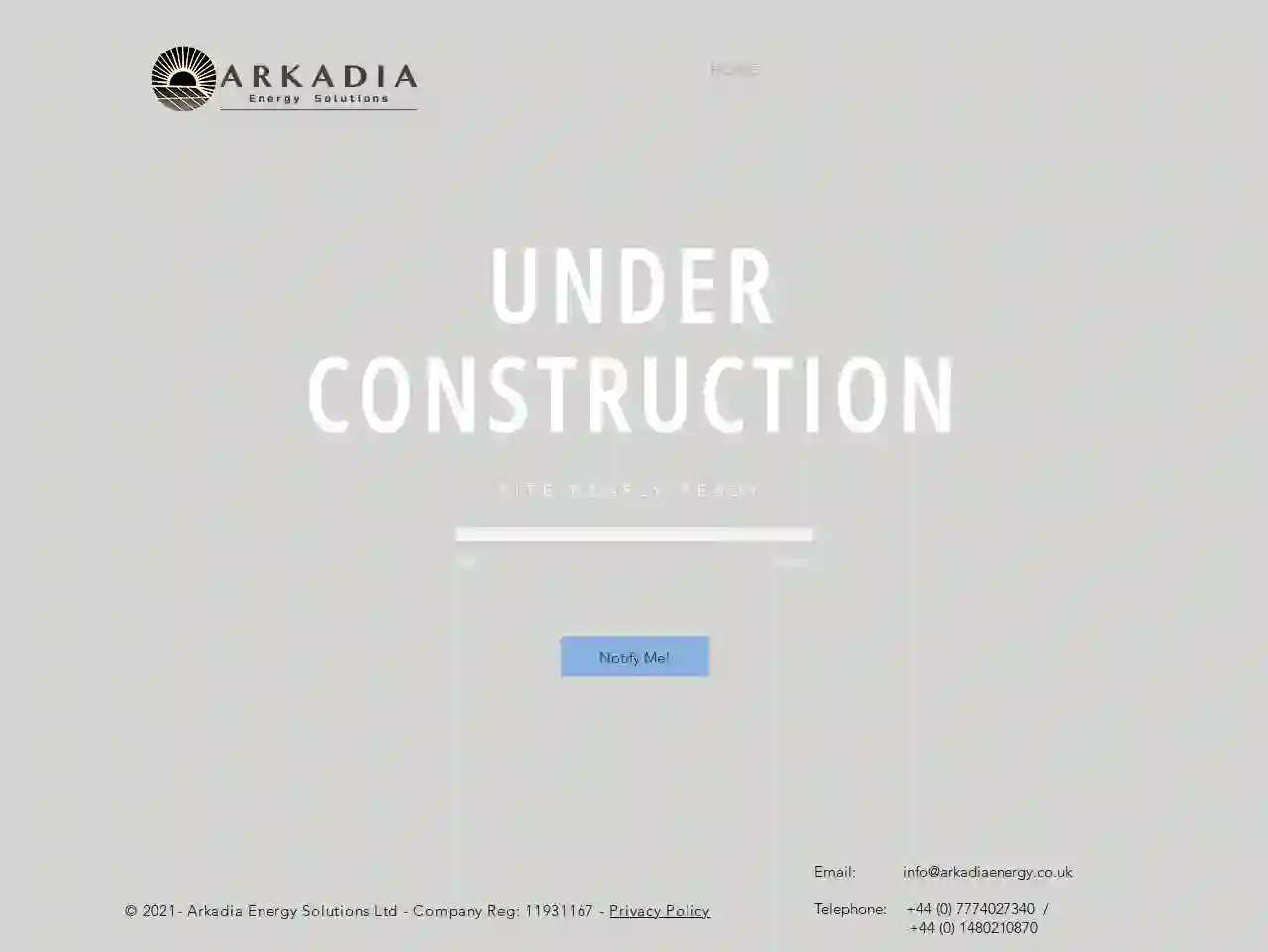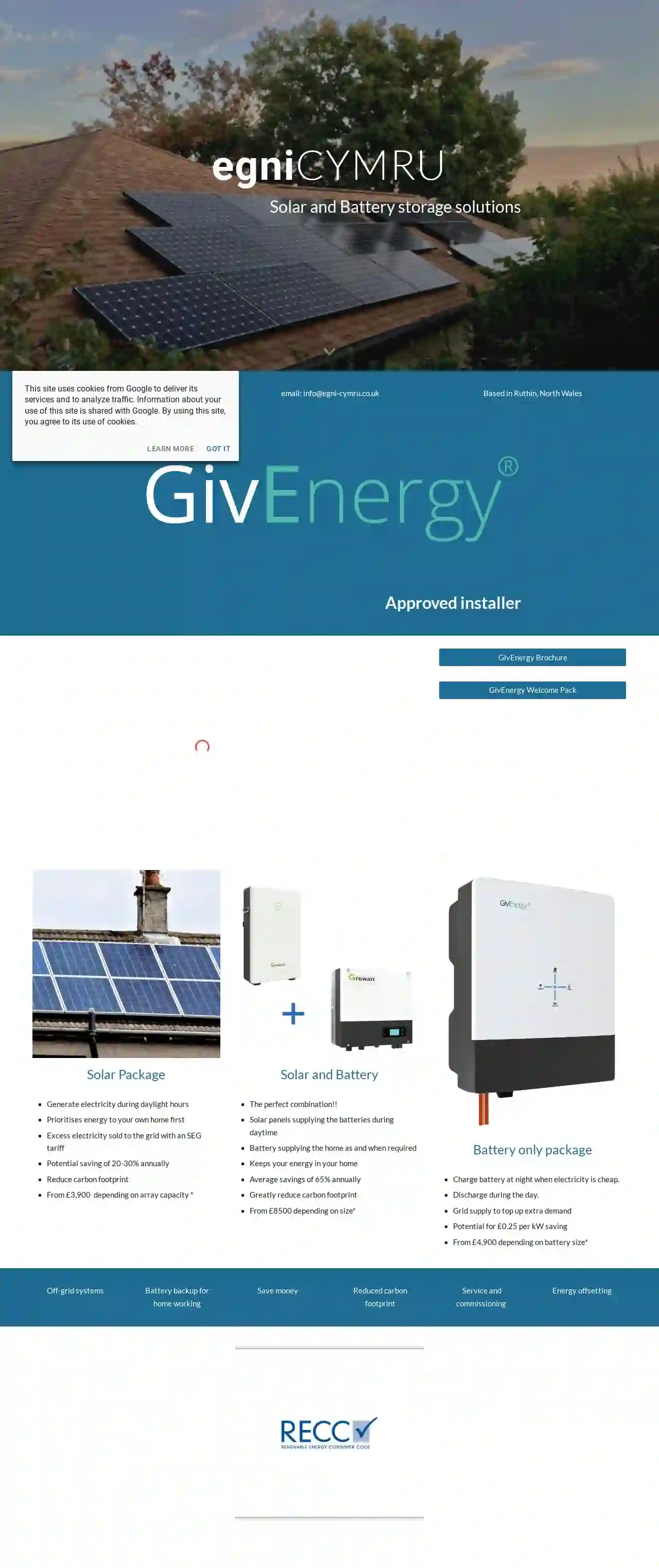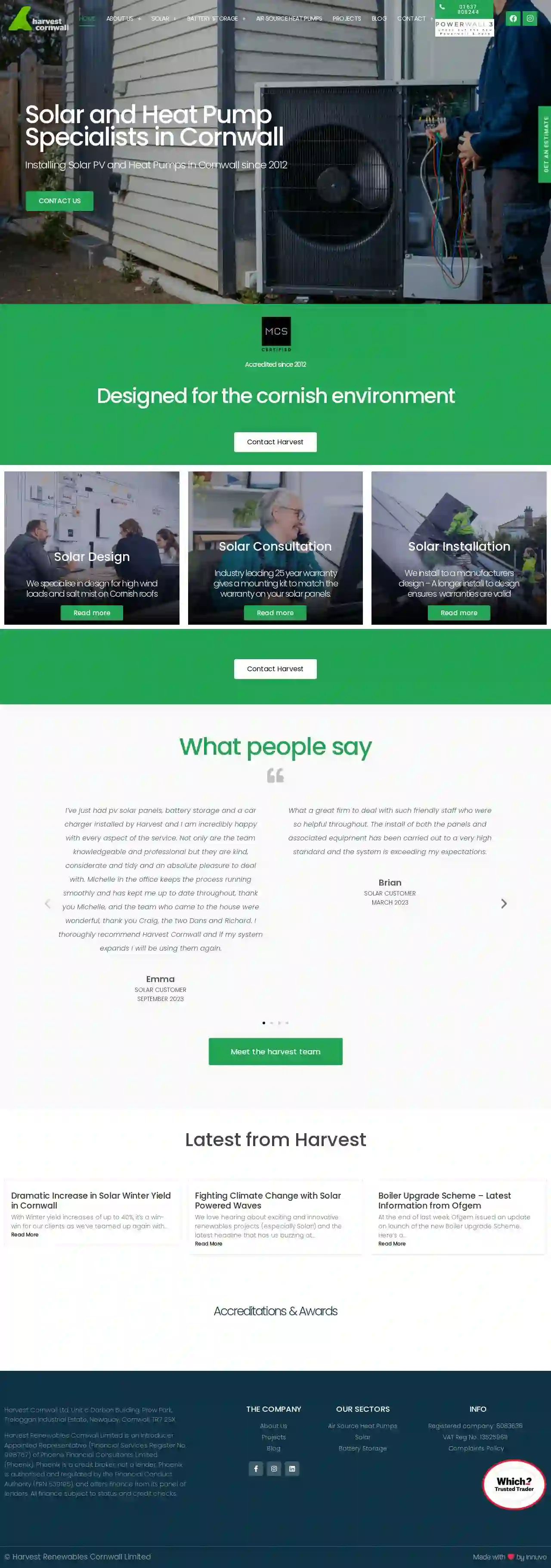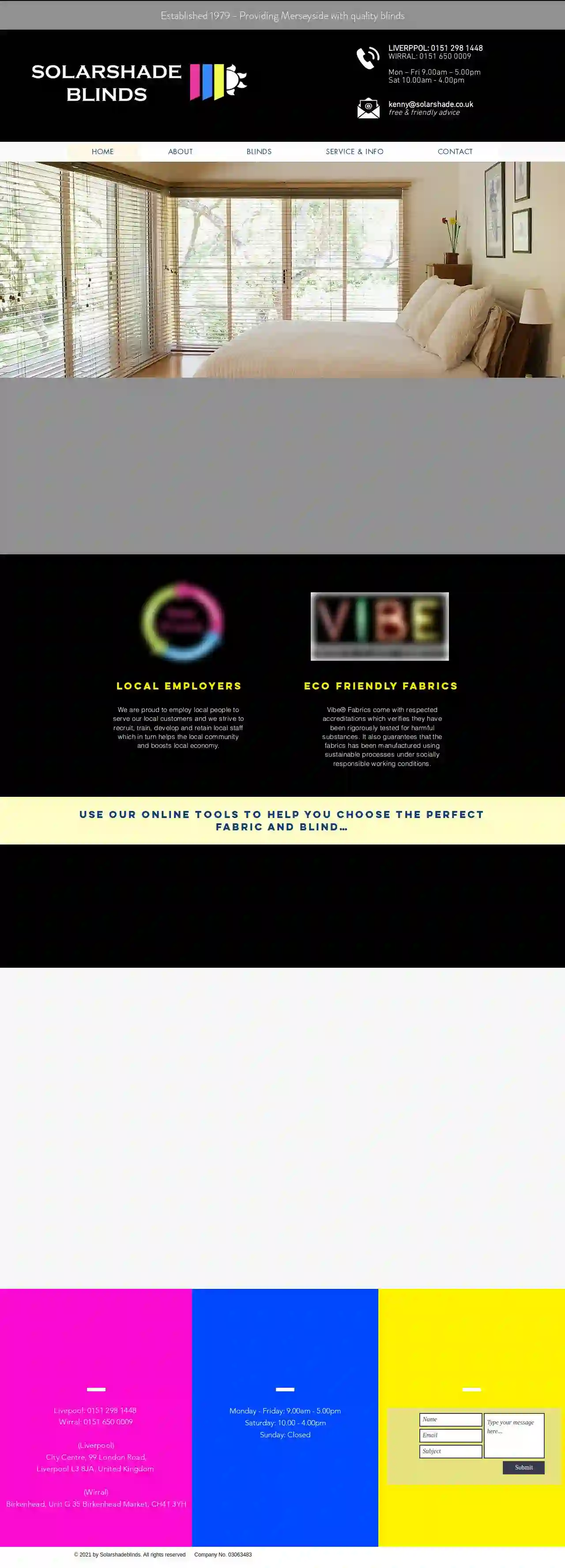Solar Installers Roby
Find the best Solar Panel Installers in Roby
Receive multiple Solar Installation Companies quotes for your project today! Compare profiles, reviews, accreditations, portfolio, etc... and choose the best offer.

CleanEarth Energy
4.931 reviewsWeston, GBPower your business with clean, abundant, affordable energy. Reduce costs and emissions, increase energy security. At CleanEarth we’ve been delivering wind turbine and solar PV projects across the UK since 2010. We’ve saved our clients millions on their energy bills while simultaneously reducing their carbon footprint. We’ve also limited their exposure to the risks of price volatility and interruption of supply. Contact us today to find out what we could do for you.
- Services
- Why Us?
- Gallery
Get Quote
Arkadia Energy
Chester, GBArkadia Energy Solutions Ltd is a company dedicated to providing sustainable energy solutions. We are currently constructing a new site which will be operational soon. You can sign up to be notified when the site is ready. Contact us for more information about our services.
- Services
- Why Us?
- Gallery
Get Quote
Egni Cymru
Chester, GBegniCYMRU provides solar and battery storage solutions based in Ruthin, North Wales. As an approved GivEnergy installer, we offer a range of packages to suit your needs, including solar only, solar and battery, and battery only options. Our systems are designed to generate electricity during daylight hours, prioritize energy for your own home first, and sell excess electricity to the grid with an SEG tariff. You can potentially save 20-30% annually on your energy bills and reduce your carbon footprint. Our solar and battery packages offer average savings of 65% annually and significantly reduce your carbon footprint. With our battery only packages, you can charge your battery at night when electricity is cheap and discharge it during the day, potentially saving £0.25 per kW. We also offer off-grid systems with battery backup for home working, saving you money and reducing your carbon footprint. Our services include installation, commissioning, energy offsetting, and ongoing support.
- Services
- Why Us?
- Gallery
Get Quote
Harvest Cornwall
510 reviewsTreloggan Industrial Estate, Newquay, Unit 6 Darbari Building, Prow Park, TR7 2SX, GBHarvest Renewables Cornwall is a team of solar and heat pump specialists based in Cornwall, installing solar PV and heat pumps in Cornwall since 2012. We specialise in design for high wind loads and salt mist on Cornish roofs, ensuring our installations are robust and reliable in the unique Cornish environment. We are accredited since 2012 and offer industry leading 25 year warranties on our solar mounting kits to match the warranty on your solar panels. We install to a manufacturer's design, ensuring warranties are valid. Our team is committed to providing excellent customer service, from initial consultation to installation and beyond. We are dedicated to helping our clients make the switch to renewable energy and reduce their carbon footprint. We offer a range of services, including: Solar Design Solar Consultation Solar Installation Battery Storage Air Source Heat Pumps EV Charging Smart Monitoring Solar Mounting Kits Battery Prices and Comparisons Heat Pump Calculator Underfloor Heating and Radiators Contact us today to learn more about how we can help you save money and reduce your environmental impact.
- Services
- Why Us?
- Accreditations
- Our Team
- Testimonials
- Gallery
Get Quote
EkoBuild
4.73 reviewsChester, GBEko-Build is a company that specializes in providing eco-friendly solutions to help reduce household running costs. With over 20 years of experience, they have installed their systems in over 100 homes, resulting in no running costs and even generating a modest income. Their products include solar panels, battery storage, underfloor heating, cupped wind generators, heat pumps, and infrared radiators. They offer a nationwide friendly, no-hard sell service and supply to trade partners.
- Services
- Why Us?
- Our Team
- Gallery
Get Quote
Green Power Renewable Solutions Ltd
56 reviews41 Chester Street, Flint, CH6 5BL, GBGreenPower Renewables Solutions Ltd is a leading solar panel business based in Flintshire, North Wales. With over 9 years of experience in the solar industry and 15 years in electricals, they are committed to helping customers reduce their energy bills and carbon footprint. They are MCS Certified and Napit registered, installing solar panel systems across the UK. GreenPower Renewables offers a range of services including solar PV, batteries, EV chargers, inverter replacements, loft insulation, and bird protection. They pride themselves on clear communication with customers throughout the entire process.
- Services
- Why Us?
- Accreditations
- Gallery
Get Quote
Green Energy International Limited
Chester, GBGreen Energy International Limited operates in the renewable energy market, with a successful track record in delivering solar energy & battery storage projects across the UK. As a team we have been successfully operating in the renewables market for over 10 years, developing utility scale solar PV. We locate, assess, design, and prepare the project from conception through to installation. We are proud to be helping the UK increase its renewable energy generation.
- Services
- Why Us?
- Testimonials
- Gallery
Get Quote
VitalSpace Estate Agents
4.8235 reviews22 Flixton Road, Urmston, M41 5AA, GBAt VitalSpace, our office never closes. At any time of the day or night, our clients can manage the sale of their property via a computer or mobile phone. We are independently recognised, 3 years running in the top 500 UK Estate Agents for marketing, service and results. Our friendly team has a huge amount of experience in your local area, as well as an exceptional understanding of the wider property market. Whatever your property needs, get in touch with our fantastic team or visit our high street office and we'll get the kettle on.
- Services
- Why Us?
- Gallery
Get Quote
TBE Solar - part of TB Electrics
Barleycastle Industrial Estate, Appleton, 8 Asher Court, Lyncastle Way, Warrington, WA4 4ST, GBTB Electrics is an Electrical Engineers & Consultants company specializing in domestic, industrial, and commercial LED Lighting, Solar PV, and Electric Vehicle Charging systems and installations based in Cheshire, United Kingdom. With years of experience and qualifications, we provide all aspects of electrical services, including rewiring, electrical installation, testing reports, and certificates. We are NICEIC Approved Contractors and MCS Approved Contractors for Solar PV. Our team is dedicated to providing the best advice, service, and installation quality for all our services, with fair and transparent pricing for all our customers.
- Services
- Why Us?
- Accreditations
- Testimonials
- Gallery
Get Quote
Solarshade Curtain & Blinds
32 reviewsCity Centre, 99 London Road, Liverpool, L3 8JA, GBEstablished in 1979, Solarshade has been providing Merseyside with high-quality blinds for over four decades. We are proud to be a local employer, serving our local customers with a team of skilled professionals. We strive to recruit, train, develop, and retain local staff, contributing to the growth of our community and economy. At Solarshade, we are committed to offering eco-friendly fabrics. Our Vibe® Fabrics are accredited and rigorously tested for harmful substances, ensuring they are manufactured sustainably and ethically. We offer a wide range of blind types to suit every need and style, including roller, vertical, Venetian, wooden, Roman, blackout, Velux, screen, pleated, conservatory, and electric blinds. Use our online tools to help you choose the perfect fabric and blind for your home.
- Services
- Why Us?
- Gallery
Get Quote
Over 3,485+ Solar Installers on our directory
Our solar contractors operate in Roby & surroundings!
SolarCompaniesHub has curated and vetted Top Solar Installers arround Roby. Find the most trustworthy business today.
Frequently Asked Questions About Solar Installers
- Use a Directory Like SolarCompaniesHub: We connect you with pre-screened, qualified solar installers in your area.
- Check Online Reviews: Look for positive reviews on Google, Yelp, and other reputable sources.
- Ask for Referrals: Get recommendations from friends, family, or neighbors who have gone solar.
- Verify Credentials: Ensure the installer is licensed, insured, and certified by reputable organizations (e.g., NABCEP in the US).
- Get Multiple Quotes: Compare quotes from at least 3-4 installers to find the best value for your project.
- Ask Questions: Don't hesitate to ask installers about their experience, warranties, and the process they follow.
- Solar Panel Warranty: From the panel manufacturer, typically covering defects in materials and workmanship for 10-25 years. Some manufacturers offer performance guarantees, ensuring a certain level of energy output over time.
- Solar Installation Warranty: From the solar installer, covering the quality of the installation work for 1-10 years. This warranty protects you from leaks, faulty wiring, or other issues caused by improper installation.
How do I find a good solar installer near me?
What kind of warranty should I expect for my solar panel system?
Can I go completely off-grid with solar panels?
Do I need to replace my roof before installing solar panels?
How do I find a good solar installer near me?
- Use a Directory Like SolarCompaniesHub: We connect you with pre-screened, qualified solar installers in your area.
- Check Online Reviews: Look for positive reviews on Google, Yelp, and other reputable sources.
- Ask for Referrals: Get recommendations from friends, family, or neighbors who have gone solar.
- Verify Credentials: Ensure the installer is licensed, insured, and certified by reputable organizations (e.g., NABCEP in the US).
- Get Multiple Quotes: Compare quotes from at least 3-4 installers to find the best value for your project.
- Ask Questions: Don't hesitate to ask installers about their experience, warranties, and the process they follow.
What kind of warranty should I expect for my solar panel system?
- Solar Panel Warranty: From the panel manufacturer, typically covering defects in materials and workmanship for 10-25 years. Some manufacturers offer performance guarantees, ensuring a certain level of energy output over time.
- Solar Installation Warranty: From the solar installer, covering the quality of the installation work for 1-10 years. This warranty protects you from leaks, faulty wiring, or other issues caused by improper installation.